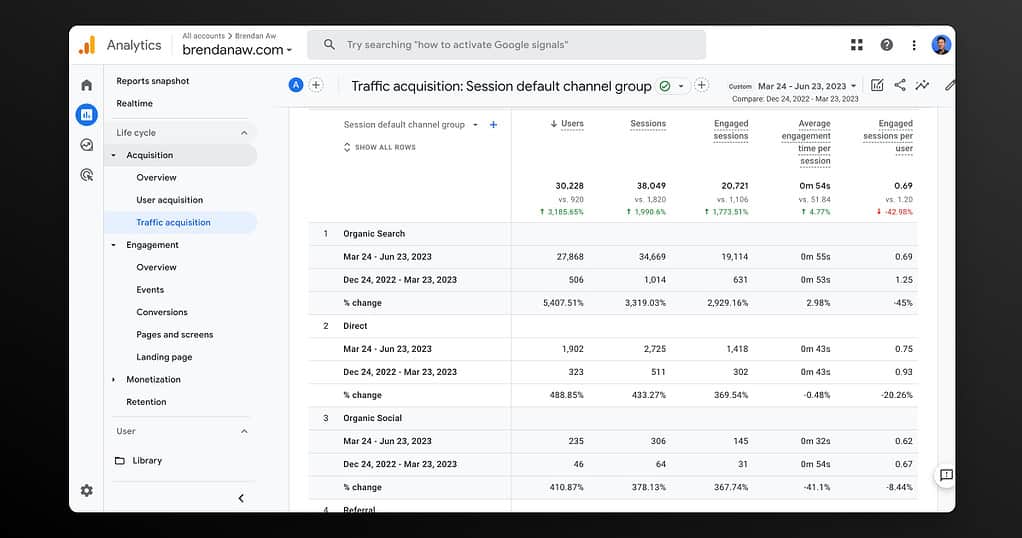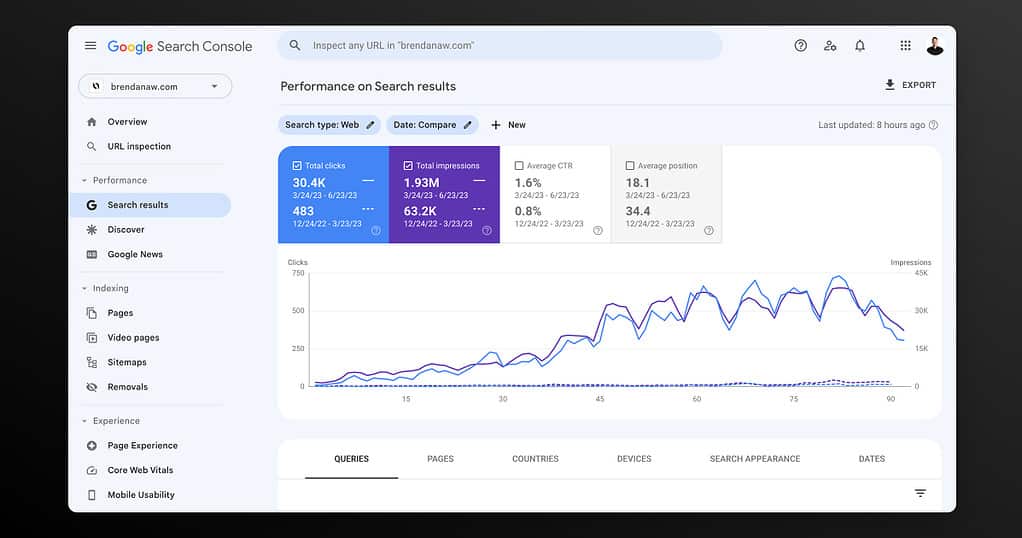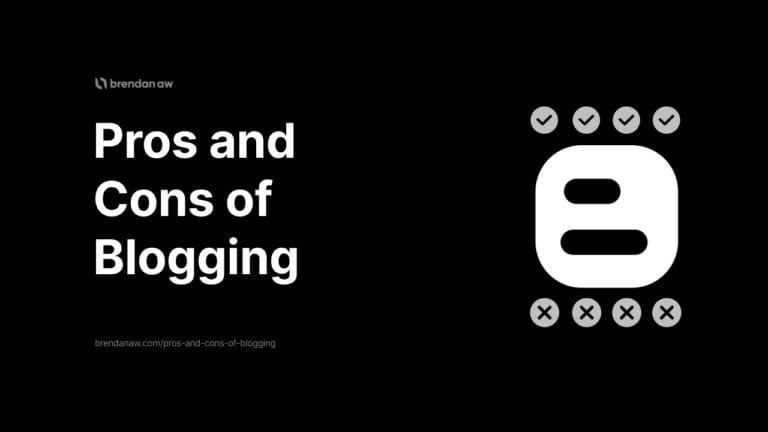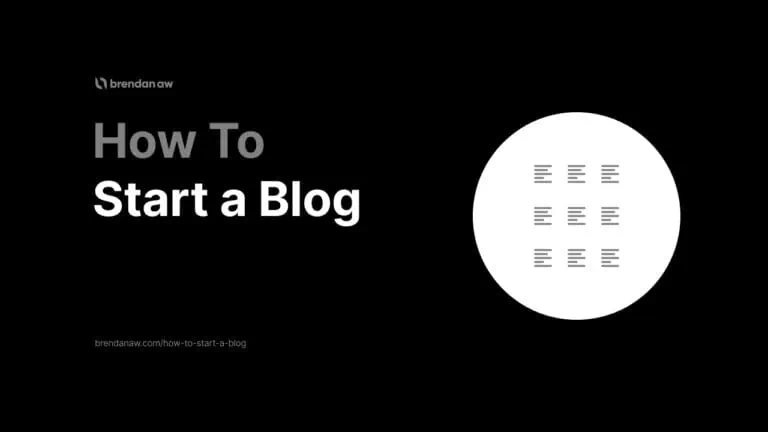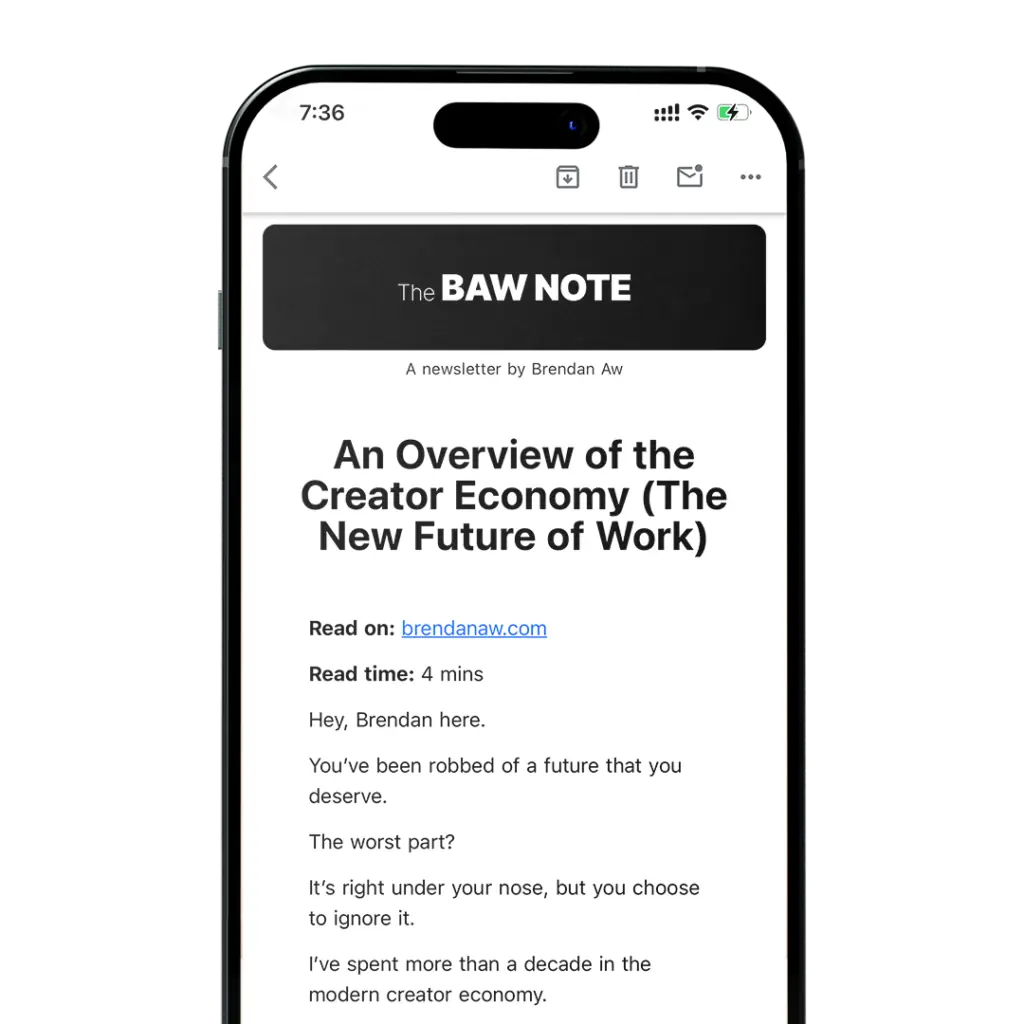Are you still trying to decide whether to start blogging?
The idea of starting a blog seems tough enough.
Slap on the demands of SEO… you might give up.
But if you want to boost site traffic, this is one of the best ways.
Blog posts leverage SEO content by writing articles optimized for keywords your target customers are searching for.
This helps Google recognize your website as a reliable source of answers to people’s queries while giving you consistent traffic over time.
You will need to work on building a content strategy. That means producing content regularly.
In the end, it’ll be worth it.
I promise.
Does Blogging Help SEO?
Yes, it does.
Case in point: this website.
I started increasing blog posts around March this year.
You can see that users brought by organic search have increased by a whopping 5,407% compared to the previous quarter.
Other channels are enjoying an increase in traffic as well.
Users and sessions from direct traffic increased by 488.85% and 433.27%, respectively. This is a good indicator of better brand awareness for my blog.
Organic Social traffic has increased as well.
In just a few months, my website generated 1.9 Million site impressions and 30,400 clicks.
I think that’s pretty impressive.
Of course, there are a lot of factors that came into play. For one, having solid keyword research played a big role.
I happened to use the right keywords at the right time.
Also, best on-page SEO practices, good content strategy, and solid copywriting are key contributors to this traffic increase.
Blogging allowed me to employ my best content and technical SEO strategies to achieve consistent growth for my brand via organic searches.
How Do Blogs Help SEO?
Blogging is one of the most user-friendly ways to drive traffic and improve rankings.
It’s definitely better than buying shady backlinks (many companies and bloggers do it btw).
It’s just a natural process of generating fresh, relevant content that constantly allows your site to appear in query results.
Here are some benefits of blogging for SEO.
- Allows You to Target More Keywords
- Generates Leads for Your Business
- Earns Quality Backlinks to Your Site
- Builds Brand Identity
- Demonstrates Experience, Expertise, Authority and Trust
- Improves Internal Linking Structure
- Assists Social Media Efforts
- Improves Engagement and User Experience
1. Allows You to Target More Keywords
It gives you a chance to target more keywords.
Aside from the ones you already use in your main landing pages, these are different.
Usually, the main pages’ keywords are the ones that your competitors are most likely to use. Many other possible keywords don’t fit well on your main pages.
You’ll have an opportunity to cast a wider net with blogging. You can insert other keywords within your niche that are related to your products or services.
You have to think of topics that are relevant and engaging.
For example, you have a website about a hotel in Paris.
Your homepage is already optimized with the main keywords. The same goes for the accommodation, facilities, and special offers pages.
But there might be other topics of interest for your potential customers. You can perform keyword research to identify interesting topics around hotels and start publishing blog content.
Another example is my website (the one you’re reading now).
There’s not much room for keywords on my main landing pages. They mostly direct users to other pages.
Most of my target keywords appear on https://brendanaw.com/blog.
I cover topics like:
- General marketing
- Copywriting
- Affiliate marketing
- SEO
- AI content
- Notion
- Web3
Nowadays, plenty of useful AI SEO tools provide deeper insights into topics and keywords your audience might be interested in.
With blogging, you can target various long-tail keywords or go after more generic keywords when building a content strategy.
You could also target new keywords by performing a content update. This is a good way to keep your site fresh and relevant.
2. Generates Leads for Your Business
A blog post can be a lead generator.
With the help of valuable content, you could lead users to explore products and services pages. Give them a nudge in that direction.
You may also encourage them to sign up for a lead generation form. This could be a newsletter subscription or anything of that sort.
With this type of blog post, it’s important to have a Bottom of Funnel content strategy.
Use direct-response copywriting and clear CTAs to gently push your customers to action.
If you’re outsourcing writers for this, ensure you provide them with an SEO content brief.
3. Earns Quality Backlinks to Your Site
Blogging is one of the best ways to naturally build high-quality backlinks to your site.
Having several quality inbound links is a ranking signal for search algorithms.
You should use credible and authoritative referring domains to link to your site.
If your blog post can provide unique and accurate information, it will likely be cited as a source.
Aside from being a ranking factor, it also helps strengthen domain authority. This helps pass PageRank to other pages on your website.
4. Builds Brand Identity
Blogging lets you tell stories, provide useful tips, and share brand visions and values.
Your customers are more likely to remember you that way. You’ll become a go-to source of valuable information for them.
You get recognized by more eyes and earn engagement on other platforms, such as social media.
It’s a good way to mention your brand in many more places.
This will boost search engine visibility and improve brand recognition offline.
5. Demonstrates Experience, Expertise, Authority and Trust
Google updated one of its search evaluator guidelines to E-E-A-T. This stands for Experience-Expertise-Authority-Trustworthiness.
You’ll have the opportunity to showcase your expertise in your industry. This is what I’m doing with my blog today.
AI is changing SEO, and Google emphasizes the importance of real-life, first-hand experience.
Having a blog is an excellent way to meet Google’s new criteria.
This is non-negotiable…
In my case, I find it fun and fulfilling as well.
It pushes me to explore this industry and learn new things to share with my audience.
6. Improves Internal Linking Structure
Internal linking spreads “link juice” throughout the pages of your site. It also helps web crawlers better understand your site’s hierarchical structure, making crawling more efficient.
Not to mention, it’s great for user experience since it aids navigation and encourages longer dwell time.
More blog posts make building a solid internal linking strategy easier than just landing pages.
Another benefit is funneling new traffic to your older posts.
That’s why it’s vital to create “evergreen” content. You can opt to revive traffic by linking to them from newer posts.
The choice of anchor texts is also essential.
Always provide context by including relevant keywords so search engines and people know what the target page is about.
7. Assists Social Media Efforts
Blogging and social media go hand in hand.
When you share blog posts on social media, you leverage the power of the network effect to reach more followers.
People tend to share blog posts they find interesting with their connections and friends, who will share them again with their friends.
It’s snowballs…
That’s why it’s important to build jaw-dropping content.
You can also repurpose your blog posts into videos, social media posts and infographics.
These links back to your website to draw traffic and more leads.
8. Improves Engagement and User Experience
User experience is a key factor in getting your website to rank.
Engagement metrics (such as bounce rate and session duration) signal relevance and usefulness to Google.
Having a blog gives your users a lot more to digest and explore. It sends them down a rabbit hole of information and entertainment.
Your blog becomes a quality source of information in search engines’ eyes the longer users stay on it.
Focusing on just the main landing pages will limit your opportunities.
How To Optimize Your Blog for Search Engine Optimization?
Having a blog does not magically improve your site traffic overnight.
You would still have to work on optimizing it. Results would depend on your SEO strategy.
Understand Your Target Audience
You won’t be able to create content that resonates and ranks if you don’t know who your target audience is…
This includes their:
- Demographics
- Psychographics
- Interests
In most cases, it would mean creating a buyer persona.
These would guide you in choosing keywords and formulating your overall content strategy.
Satisfy Search Intent
Search intent is the ‘why’ behind a person’s search.
The search intent behind a keyword could be:
- Informational
- Commercial
- Transactional
- Navigational
Here’s an easy way to figure this out…
Look at the top 3-5 articles on the SERP (Search Engine Results Page).
If they are primarily listicles, then you know searchers are looking for a list of ideas.
Writing a how-to guide will not answer their question, resulting in higher bounce rates and a negative ranking signal.
Create a Compelling Title Tag That Hooks Readers
You only have a few seconds to capture the attention of the SERPs.
Searchers won’t even make it to your article if your title tag is not enticing.
It should also:
- Contain the primary keyword
- Address the search intent (include numbers, “step-by-step guide,” “VS,”How-to”, etc.)
- Be under 60 characters to avoid truncation
- Have power words
This will give you a better idea of what type of titles gain the most impressions and clicks.
How Long Should Blogs Be for SEO?
According to Hubspot’s 2021 blog length analysis, the ideal number is 2,100 to 2,400 words.
That’s also roughly my average article length.
However, posts that have lesser can still rank as long as they’re optimized well with enough backlinks.
In my opinion, 500 words should be at the very minimum. I usually aim for at least 2,000 words.
How Often Should You Blog for SEO?
Posting three to four times a week is the sweet spot. That seems to be the consensus among experts.
But it’s unlikely you will achieve such as schedule when starting.
I started with just one a week…
And used AI writing software and freelance writers to increase my content velocity.
Too frequent, and you may compromise the quality of your articles unless you have a team.
It also poses the risk of keyword cannibalization if you don’t have a proper content and keyword strategy.
Maintain a publishing cadence that is viable with your current resources.
Does Blogging Help SEO? (FAQs)
Are Blog Posts or Pages Better for SEO?
Blog posts are published and updated ongoingly, while pages tend to be evergreen. However, some sites interchange both, and it doesn’t seem to have a huge impact on SEO.
In my experience, pillar posts that are comprehensive, informational and evergreen tend to be pages while individual blog posts related to that main topic are housed under them to build out content clusters.
But I use blog posts for all, which doesn’t seem to hinder my SEO efforts, so don’t worry about it.
How Can Blogging Help With SEO?
Blogging can immensely help with SEO by driving significant traffic to your website. Fresh content posted regularly on your blog can act as a signal for search engines, indicating that your website is active and consistently being updated. This means every blog post you publish becomes a new indexed page for search engines to consider, contributing further to your visibility in the search results.
What Is the Role of Keywords in Blog Content and SEO?
Keywords help you improve your SEO by determining what users are searching for and enabling you to optimize your blog content for these direct searches. Do this right, and make your posts more visible in search results, consequently driving higher search traffic to your blog.
How Can Good Blog Posts Improve My Website’s Ranking?
High-quality blog posts can lead to greater user retention, more shares, and higher chances of scoring backlinks from reputable sources, all contributing to improved search engine rankings.
How Does Blogging Help With Link Building?
Blogging helps incentivize other websites to link to your articles if they add greater value to theirs. It gives your website greater credibility and domain authority, resulting in higher rankings.
How Does Fresh Blog Content Impact SEO?
Google’s number one priority is to serve users the best and most recent content. Fresh content directly contributes to SEO by providing new opportunities for ranking in SERPs. Moreover, regular updates show that the website is active and suitable for frequent indexing. Google loves fresh content, and it offers users the most recent and relevant results, enhancing your blog traffic.
What Are Some SEO Best Practices for Blogging?
There are many SEO best practices for blogging, and it requires an entire article on its own.
But here are some tips:
• Incorporate target keywords naturally into your blog’s text
• Properly using alt text for images
• Optimizing your blog’s page speed for better UX
• Crafting enticing title tags and meta descriptions to improve click-through rates
You can check out my articles on a blog post checklist and an SEO copywriting checklist for more juicy secrets.
How Does Blogging Help Improve My Online Visibility on SERPs?
Blogging lets you cover various topics related to your industry or niche, meaning you can rank for various relevant keywords. By consistently publishing keyword-sensitive content on your blog, you significantly increase your chances of appearing in various search engine results, improving your SEO.
How Does Blogging Build Online Reputation and Trust, Contributing to SEO?
Blogging helps develop a consistent and reliable online reputation, indirectly contributing to SEO. High-quality blog posts are inclined to be shared on social media and referenced by other websites, effectively contributing to your link-building efforts. You become a trusted source in Google’s and readers’ eyes over time.
What Role Does a Blogging Frequency Play in SEO?
The more frequently you blog, the more often search engines index your website. Every new article gives you another chance to rank in SERPs. But you must maintain the quality of content while being consistent, as high-quality blog posts are the only thing that matters for SEO.
To Sum Up
So I’ve established that Blogging is a helpful tool for improving SEO.
It provides a platform to execute, demonstrate expertise, and get consistent traffic to your brand over time.
You can:
- Target more keywords
- Generate leads
- Improve domain authority
- Build relationships
Understanding your audience is a fundamental step. From there, you can choose the right keywords and identify search intent.
You could maximize your blogging efforts by utilizing social media.
Blogging is my preferred content activity over any other platform when building any brand.
Alright, that’s all!
Please share this article and comment below to receive infinite good luck 🙂


